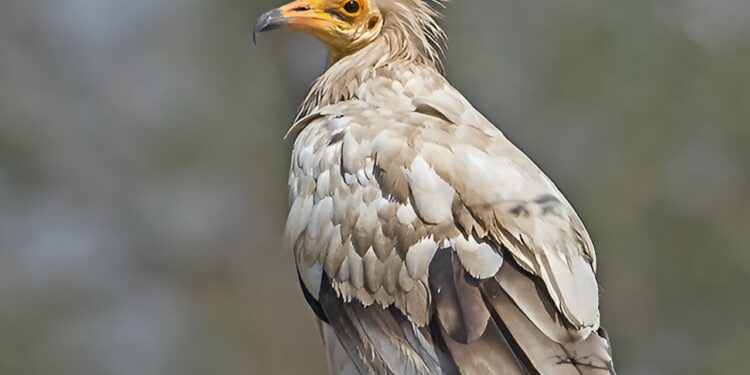Neophron percopterus, also known as the white scavenging vulture or Pharaoh’s chicken, is a common scavenger seen in landfills in northern India. Tal Chapar Black Buck Sanctuary, October 2014. Credit: Wikimedia Commons, CC BY 2.0
Two types of experiences affect animals’ behavioral skills: the animal’s environment during early development and experience gained. Researchers from Ben-Gurion University of the Negev tracked Egyptian vultures during migration, a critical and difficult time for them, and studied how their flight skills developed by examining their performance using tracking at high resolution.
Their findings are published in the journal Current biology.
The flight capabilities of two groups of birds of the Egyptian vulture (Neophron percnopterus), a long-distance gliding raptor, were assessed using GPS transmitters for 127 autumn migrations of 65 individuals. The two groups were quite different in terms of their early life experiences: one group was raised in captivity and the other in the wild.
Birds in both groups improved their flight and migration performance as they gained experience. However, the observed improvements were more evident for captive-bred vultures.
During their first migration, birds raised in captivity were less efficient but could catch up with the migratory performance of those raised in the wild by the second migration. Thus, the experience acquired made it possible to compensate very early for the shortcomings of their first life experience.
Just as it is more difficult for humans to learn a language in old age, vultures born in captivity and later released struggled to learn the necessary flight and roaming skills, but eventually caught up with those who had learned earlier.
“We were able to generate data on the migration and flight skills of vultures. The data provided insight into the value of early experience and acquired experience and their impact on the birds’ ability to cope with difficult periods such as migration.” explained Dr. Ron Efrat, one of the lead researchers, who recently completed his doctoral studies in the laboratory of Professor Oded Berger-Tal at the Jacob Blaustein Institute for Desert Research at Ben-Gurion University of Negev.
“It seems that birds, like humans, are also affected by their life experience,” he concluded.
More information:
Ron Efrat et al, Early and accumulated experience shapes migration and flight in Egyptian vultures, Current biology (2023). DOI: 10.1016/j.cub.2023.11.012
Provided by Ben-Gurion University of the Negev
Quote: Study shows captive-bred Egyptian vultures can improve flight and migration performance (January 8, 2024) retrieved January 9, 2024 from
This document is subject to copyright. Apart from fair use for private study or research purposes, no part may be reproduced without written permission. The content is provided for information only.



